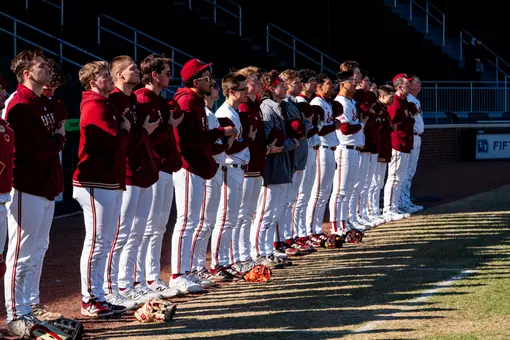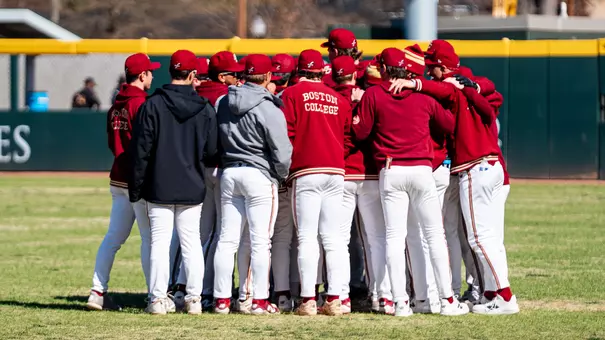Boston College Athletics

Photo by: Joe Sullivan
Welcome To The ACC Tournament
May 22, 2023 | Baseball, #ForBoston Files
With BC playing at least two games this week, it's worth a look at what all of this means.
Friday brought a more memorable experience to the Boston College baseball history book after inclement weather forced the reshuffling of the season-ending weekend series against Notre Dame. A day-night doubleheader across two ballparks in Boston ensued, and after the Eagles defeated their Holy War rivals in a game at their Brighton-based Harrington Athletics Village, the teams squared off in the 11th annual ALS Awareness Game at Fenway Park.
The unique twinbill was akin to a 2008 Subway Series doubleheader in New York that featured a Yankees home game in the afternoon before shifting to a Mets home game at Shea Stadium at night, but the BC sweep forced the Eagles to watch the final day of the regular season from their perch in the Pete Frates Center. Having already clinched a spot in the ACC Tournament, it wasn't clear who BC would play - or when - until well after final scores poured in from around the conference's final day.
In the end, both BC and Notre Dame departed Boston on flights bound for Tobacco Road's Durham Bulls Athletic Park, but the series victory by BC translated two very different finishes. The Fighting Irish were once in position for a run at seventh place and a matchup with the Coastal Division champion, but an eighth place finish instead relegated them to a re-match against top-seeded Wake Forest, while BC earned a surprising sixth-place finish and dates with third-seeded Clemson and 10th-seeded Virginia Tech.
The dust had finally settled, but as this week began, the next stage kicked up the chaos on a BC postseason candidacy that opens the ACC Baseball Tournament with plenty to prove and plenty to discuss.
"To get to where we were [at the end of the season], you had to have responses," said head coach Mike Gambino. "You had to come back from getting thumped on opening night [by Pepperdine], and we came back and won the series. You had to deal with a doubleheader at Virginia Tech when it was freezing and a doubleheader at Kennesaw State when it was hot out…The closeness of this group, there's a real love in the clubhouse with these guys, and then the way they play, the way they go about it, how hard they play. They just keep doing it over and over, and I'm excited for the postseason."
College baseball itself is an everyday process that crams 50-plus games into a four-month regular season, so the traditional postseason tournament is similarly built around double-elimination formats and multiple games played across several days. The majority of conferences force teams to play upwards of a half-dozen games, and the results are factored into postseason resumes as quality wins that count the same as a regular season conference matchup.
Better-finishing teams are always given some sort of "champion's advantage," while lower-seeded teams are handed more grueling paths to a single-elimination semifinal or final round. Early first round games are often treated as play-in games, and once qualified, teams play-off in double-elimination formats that split the conference along its seeding lines.
It's a format the ACC employed before realignment expanded the league's ranks in the mid-2000s. Once a nine-team league, the conference qualified all of its teams for the postseason but forced its bottom two seeds to play a single-elimination play-in game. Once it culled the ranks to eight teams, the league played a double-elimination bracket that culminated in a final between the winner's bracket and loser's bracket winner. Similar to the NCAA Tournament, if the loser's bracket winner defeated the upper bracket winner in a first game, the two teams rematched into a winner-take-all format for the right to claim the conference championship.
The arrivals of Miami and Virginia Tech only slightly altered this format to include a full-blown, four-team playoff in the play-in round, to which eighth-seeded Wake Forest defeated Duke and Maryland to advance to a two-bracketed playoff featuring the remaining eight teams, but the playoff was dropped a year later when BC's arrival in 2006 split the league into two divisions. Seeding for that tournament was built around a hybrid format, and the division winners automatically earned the top two seeds of the tournament. The remaining teams were determined by a single-league format that combined the two divisions, which in turn resulted in two intradivisional matchups and two crossover games in the first round.
That entire system was similar to the rest of the country, but in 2007, the ACC's switch to a round-robin forever altered how the league approached its postseason. Qualification was still the same as the 2006 system, but the eight teams broke into two divisions that guaranteed at least three games. Head-to-head tiebreakers determined who advanced, and the winners of each league played a single-elimination league championship, to which eighth-seeded Wake Forest nearly won the league in the first year of the format.
This arrangement survived a full decade with nominal changes after the league's additions of Notre Dame and Pittsburgh expanded the qualification to 12 teams, but the two-league format was broken into three, four-team pools. Everyone gained two games, and pod champions advanced to the single-elimination semifinals. For what it's worth, BC actually qualified for that inaugural season in 2017 and played in a pod for the first time since the 2007 redesign after having missed pool play in 2016 when it lost a play-in game to Georgia Tech.
The Eagles lost both games of their pool that year but produced a Cinderella run two years later when they qualified for the ACC Tournament as the last available team. They were last in the Atlantic Division, but their 12-18 record slotted them 12th because both Virginia Tech and Pittsburgh finished with worse overall records in the Coastal Division. They were placed into a pod with the league's regular season champion, but after beating both Louisville and eighth-place Clemson, BC lost to fifth-seeded North Carolina in the league semifinals.
Better-seeded teams dictate which teams play on which days, and that 2019 team was forced to play consecutive games at 11 a.m. on the tournament's first two days. Understanding how that happened, this year's team was able to focus on the more immediate task by ignoring any possible opponents or any kind of scheduling chess. Even with the wins on Friday, there was no way of knowing who, how or when BC would play, and it crystallized the tasks in both Brighton and Boston.
"It doesn't matter where [teams finish] in the conference," Gambino emphasized. "I didn't look at the scores, but you know you need wins to try and solidify national seeds. There were five teams in the mix that were on the [national] bubble that needed to win to get into the national tournament. There were five other teams fighting to get into the ACC Tournament."
Those events and circumstances now hang over an ACC Tournament that broke BC into the sixth spot with an opportunity to convince the NCAA selection committee to grant a host site to the Eagles. Unofficially a lock to make the national tournament, the sixth-place finish sent BC into a pod with third-place Clemson despite the Tigers' better overall record than second-place Virginia, which won the Coastal Division. Virginia Tech then upset Wake Forest on Saturday after the Demon Deacons rested the majority of their team on the last day of the regular season, and coupled with Georgia Tech's three-game loss to Virginia, the Hokies slid into the No. 10 seed while the Yellow Jackets backslid into a pod North Carolina and, ironically, the 'Hoos.
The field summarily filled out from there with Notre Dame's eighth place spot slotting into the pool with Wake, which won the regular season championship, and Pittsburgh, which was the last team into the tournament, while Miami, Duke and NC State qualified for the final pool as the fourth, fifth, and ninth place teams. The schedule was then backfilled by the ACC, to which BC's pod forced the Eagles to play Tuesday's first game of the tournament against Virginia Tech before a Friday matchup with Clemson.
It feels like an advantageous setup, but that first game is essentially an elimination game because the league revamped its tiebreaker format when the system changed to the four pods to grant a different champion's advantage. Regardless of head-to-head results, the "better seed" always advances if there's a standings tie, which in turn means the lower-seeded teams have to win twice while the pod's incumbent top seed only needs one win over the team that wins that first game.
Based purely on the math, the winner of the BC-Virginia Tech game has to beat Clemson to advance, and Clemson's game against the loser of that first matchup is irrelevant because a two-way or three-way tie would still grant the Tigers the seeding tiebreaker. Given that the game is on Tuesday, the idea is then that both Virginia Tech and BC have to play like there's no tomorrow, and if the Hokies win, they have to turn around one day later and play Clemson with a potentially-gutted pitching staff. If BC wins, the Clemson-Virginia Tech game is meaningless to the standings, and Clemson can rest the bulk of its staff before playing the Eagles on Friday.
All of this decides which team advances to Saturday's semifinal, at which point the single-elimination format applies to every team heading into Sunday's championship and the overall NCAA selection show, but it's also worth noting how both games will hit BC's final Ratings Performance Index statistic. Given how that impacts the national championship race and the hunt for a regional hosting site, it's safe to call the games as critical as last week's games against Notre Dame.
"Everybody [is] fighting," said Gambino, "and that is what makes this league so great. That's what very few people don't realize, what that grind is like how hard [leagues like] the ACC and SEC are."
BC and Virginia Tech kick off the 2023 ACC Baseball Tournament on Tuesday with first pitch scheduled for 11 a.m. The game can be seen on ACC Network with all games on the channel until the championship game's appearance on ESPN2 on Sunday.
The unique twinbill was akin to a 2008 Subway Series doubleheader in New York that featured a Yankees home game in the afternoon before shifting to a Mets home game at Shea Stadium at night, but the BC sweep forced the Eagles to watch the final day of the regular season from their perch in the Pete Frates Center. Having already clinched a spot in the ACC Tournament, it wasn't clear who BC would play - or when - until well after final scores poured in from around the conference's final day.
In the end, both BC and Notre Dame departed Boston on flights bound for Tobacco Road's Durham Bulls Athletic Park, but the series victory by BC translated two very different finishes. The Fighting Irish were once in position for a run at seventh place and a matchup with the Coastal Division champion, but an eighth place finish instead relegated them to a re-match against top-seeded Wake Forest, while BC earned a surprising sixth-place finish and dates with third-seeded Clemson and 10th-seeded Virginia Tech.
The dust had finally settled, but as this week began, the next stage kicked up the chaos on a BC postseason candidacy that opens the ACC Baseball Tournament with plenty to prove and plenty to discuss.
"To get to where we were [at the end of the season], you had to have responses," said head coach Mike Gambino. "You had to come back from getting thumped on opening night [by Pepperdine], and we came back and won the series. You had to deal with a doubleheader at Virginia Tech when it was freezing and a doubleheader at Kennesaw State when it was hot out…The closeness of this group, there's a real love in the clubhouse with these guys, and then the way they play, the way they go about it, how hard they play. They just keep doing it over and over, and I'm excited for the postseason."
College baseball itself is an everyday process that crams 50-plus games into a four-month regular season, so the traditional postseason tournament is similarly built around double-elimination formats and multiple games played across several days. The majority of conferences force teams to play upwards of a half-dozen games, and the results are factored into postseason resumes as quality wins that count the same as a regular season conference matchup.
Better-finishing teams are always given some sort of "champion's advantage," while lower-seeded teams are handed more grueling paths to a single-elimination semifinal or final round. Early first round games are often treated as play-in games, and once qualified, teams play-off in double-elimination formats that split the conference along its seeding lines.
It's a format the ACC employed before realignment expanded the league's ranks in the mid-2000s. Once a nine-team league, the conference qualified all of its teams for the postseason but forced its bottom two seeds to play a single-elimination play-in game. Once it culled the ranks to eight teams, the league played a double-elimination bracket that culminated in a final between the winner's bracket and loser's bracket winner. Similar to the NCAA Tournament, if the loser's bracket winner defeated the upper bracket winner in a first game, the two teams rematched into a winner-take-all format for the right to claim the conference championship.
The arrivals of Miami and Virginia Tech only slightly altered this format to include a full-blown, four-team playoff in the play-in round, to which eighth-seeded Wake Forest defeated Duke and Maryland to advance to a two-bracketed playoff featuring the remaining eight teams, but the playoff was dropped a year later when BC's arrival in 2006 split the league into two divisions. Seeding for that tournament was built around a hybrid format, and the division winners automatically earned the top two seeds of the tournament. The remaining teams were determined by a single-league format that combined the two divisions, which in turn resulted in two intradivisional matchups and two crossover games in the first round.
That entire system was similar to the rest of the country, but in 2007, the ACC's switch to a round-robin forever altered how the league approached its postseason. Qualification was still the same as the 2006 system, but the eight teams broke into two divisions that guaranteed at least three games. Head-to-head tiebreakers determined who advanced, and the winners of each league played a single-elimination league championship, to which eighth-seeded Wake Forest nearly won the league in the first year of the format.
This arrangement survived a full decade with nominal changes after the league's additions of Notre Dame and Pittsburgh expanded the qualification to 12 teams, but the two-league format was broken into three, four-team pools. Everyone gained two games, and pod champions advanced to the single-elimination semifinals. For what it's worth, BC actually qualified for that inaugural season in 2017 and played in a pod for the first time since the 2007 redesign after having missed pool play in 2016 when it lost a play-in game to Georgia Tech.
The Eagles lost both games of their pool that year but produced a Cinderella run two years later when they qualified for the ACC Tournament as the last available team. They were last in the Atlantic Division, but their 12-18 record slotted them 12th because both Virginia Tech and Pittsburgh finished with worse overall records in the Coastal Division. They were placed into a pod with the league's regular season champion, but after beating both Louisville and eighth-place Clemson, BC lost to fifth-seeded North Carolina in the league semifinals.
Better-seeded teams dictate which teams play on which days, and that 2019 team was forced to play consecutive games at 11 a.m. on the tournament's first two days. Understanding how that happened, this year's team was able to focus on the more immediate task by ignoring any possible opponents or any kind of scheduling chess. Even with the wins on Friday, there was no way of knowing who, how or when BC would play, and it crystallized the tasks in both Brighton and Boston.
"It doesn't matter where [teams finish] in the conference," Gambino emphasized. "I didn't look at the scores, but you know you need wins to try and solidify national seeds. There were five teams in the mix that were on the [national] bubble that needed to win to get into the national tournament. There were five other teams fighting to get into the ACC Tournament."
Those events and circumstances now hang over an ACC Tournament that broke BC into the sixth spot with an opportunity to convince the NCAA selection committee to grant a host site to the Eagles. Unofficially a lock to make the national tournament, the sixth-place finish sent BC into a pod with third-place Clemson despite the Tigers' better overall record than second-place Virginia, which won the Coastal Division. Virginia Tech then upset Wake Forest on Saturday after the Demon Deacons rested the majority of their team on the last day of the regular season, and coupled with Georgia Tech's three-game loss to Virginia, the Hokies slid into the No. 10 seed while the Yellow Jackets backslid into a pod North Carolina and, ironically, the 'Hoos.
The field summarily filled out from there with Notre Dame's eighth place spot slotting into the pool with Wake, which won the regular season championship, and Pittsburgh, which was the last team into the tournament, while Miami, Duke and NC State qualified for the final pool as the fourth, fifth, and ninth place teams. The schedule was then backfilled by the ACC, to which BC's pod forced the Eagles to play Tuesday's first game of the tournament against Virginia Tech before a Friday matchup with Clemson.
It feels like an advantageous setup, but that first game is essentially an elimination game because the league revamped its tiebreaker format when the system changed to the four pods to grant a different champion's advantage. Regardless of head-to-head results, the "better seed" always advances if there's a standings tie, which in turn means the lower-seeded teams have to win twice while the pod's incumbent top seed only needs one win over the team that wins that first game.
Based purely on the math, the winner of the BC-Virginia Tech game has to beat Clemson to advance, and Clemson's game against the loser of that first matchup is irrelevant because a two-way or three-way tie would still grant the Tigers the seeding tiebreaker. Given that the game is on Tuesday, the idea is then that both Virginia Tech and BC have to play like there's no tomorrow, and if the Hokies win, they have to turn around one day later and play Clemson with a potentially-gutted pitching staff. If BC wins, the Clemson-Virginia Tech game is meaningless to the standings, and Clemson can rest the bulk of its staff before playing the Eagles on Friday.
All of this decides which team advances to Saturday's semifinal, at which point the single-elimination format applies to every team heading into Sunday's championship and the overall NCAA selection show, but it's also worth noting how both games will hit BC's final Ratings Performance Index statistic. Given how that impacts the national championship race and the hunt for a regional hosting site, it's safe to call the games as critical as last week's games against Notre Dame.
"Everybody [is] fighting," said Gambino, "and that is what makes this league so great. That's what very few people don't realize, what that grind is like how hard [leagues like] the ACC and SEC are."
BC and Virginia Tech kick off the 2023 ACC Baseball Tournament on Tuesday with first pitch scheduled for 11 a.m. The game can be seen on ACC Network with all games on the channel until the championship game's appearance on ESPN2 on Sunday.
Men's Basketball: Miami Postgame Press Conference (Feb. 28, 2026)
Saturday, February 28
From the Desk of Blake James: Episode 7
Saturday, February 28
Men's Basketball Recap: 68-67 Win vs Wake Forest
Thursday, February 26
Men's Basketball: Wake Forest Postgame Press Conference (Feb. 25, 2026)
Thursday, February 26


















